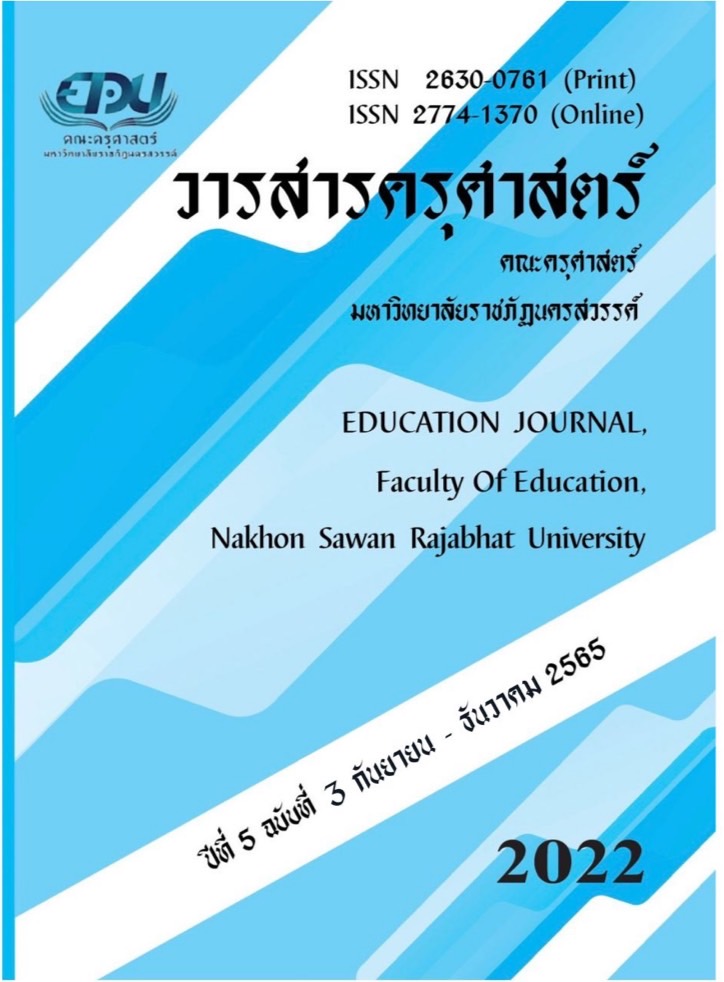The Development of a Model in Preparation for Practicing Experience Training to Enhance Learning Management Ability for Student Teachers of Lampang Rajabhat University
Main Article Content
Abstract
This research aimed to 1) study the data base for model development 2) create and verify the model quality and 3) compare the students’ ability in learning management before and after using the model. The sample group was 30 fourth year Bachelor's degree students’ in 1st semester, academic year 2020, Faculty of Education, Lampang Rajabhat University obtained by simple random sampling, using the lottery. The research instruments were the learning management development questionnaire by IOC = 0.6 - 1.0, the student teacher preparation testing form by IOC = 0.6 - 1.0, the model quality evaluation form by IOC = 0.8 - 1.0, and the students’ ability testing form by IOC = 0.6 - 1.0, p = 0.26 - 0.38, r = 0.51 - 0.76 and α = 0.96. The data were analyzed by mean, standard deviation, content analysis and t-test. The research results were found as follows;
- The student teachers had to develop the active learning management model and the school advisor recommended them to have more variety of leaning activity which directly and effectively support the learners.
2. The development of a model in preparation for practicing experience training to enhance learning management ability for student teachers of Lampang Rajabhat University consisted of 5 elements; principle, objective, contents, activity management process, and evaluation. The development of a model in preparation for practicing experience training to enhance learning management ability for student teachers of Lampang Rajabhat University was then verified by experts found that the model was the highest level at = 4.52, S.D. = 0.29. 3) The student teachers had more ability after using the model which was in higher at .05 level of significance.
Downloads
Article Details

This work is licensed under a Creative Commons Attribution-NonCommercial-NoDerivatives 4.0 International License.
References
ชัยวัฒน์ สุทธิรัตน์. (2557). ศิลปะการสอนเพื่อผู้เรียนในศตวรรษที่ 21. กรุงเทพฯ: วีพรินท์.
เชาวรินทร์ แก้วพรม, และคณะ. (2564). รูปแบบการพัฒนาครูด้านการจัดการเรียนรู้ในศตวรรษที่ 21 สำหรับโรงเรียน ขยายโอกาสทางการศึกษา สังกัดสำนักงานเขตพื้นที่การศึกษาประถมศึกษาขอนแก่น เขต 3. วารสารวิชาการธรรมทรรศน์, 21(4): 115 - 212.
ทิศนา แขมมณี. (2555). ศาสตร์การสอน: องค์ความรู้เพื่อการจัดกระบวนการเรียนรู้ที่มีประสิทธิภาพ. กรุงเทพฯ: สำนักพิมพ์แห่งจุฬาลงกรณ์มหาวิทยาลัย.
ธัญพร ชื่นกลิ่น. (2553). การพัฒนารูปแบบการโค้ช เพื่อพัฒนาสมรรถนะการจัดการเรียนรู้ของอาจารย์พยาบาลที่ส่งเสริมทักษะการคิดอย่างมีวิจารณญาณของนักศึกษาพยาบาล ในสังกัดสถาบันพระบรมราชชนก กระทรวงสาธารณสุข. วิทยานิพนธ์ปริญญาปรัชญาดุษฎีบัณฑิต (หลักสูตรและการสอน). มหาวิทยาลัยศิลปากร.
ธานี นงนุช. (2542). ปัญหาการฝึกประสบการณ์วิชาชีพครูและแนวทางการพัฒนาการฝึกประสบการณ์วิชาชีพครูของสถาบันราชภัฏอุบลราชธานี. (รายงานผลการวิจัย). อุบลราชธานี: สถาบันราชภัฏอุบลราชธานี.
ปิยะนารถ จันทร์เล็ก. (2556). การพัฒนารูปแบบกิจกรรมเตรียมความพร้อมการออกฝึกประสบการณ์วิชาชีพเพื่อส่งเสริมคุณลักษณะที่พึงประสงค์ สำหรับนักศึกษาหลักสูตรครุศาสตร์อุตสาหกรรมบัณฑิต สาขาครุศาสตร์เกษตร. วิทยานิพนธ์การศึกษาดุษฎีบัณฑิต (หลักสูตรและการสอน). มหาวิทยาลัยนเรศวร.
พิมพันธ์ เดชะคุปต์. (2558). รู้เนื้อหาก่อนสอนเก่ง การเปลี่ยนวัฒนธรรมคุณภาพในศตวรรษที่ 21. กรุงเทพฯ: สำนักพิมพ์แห่งจุฬาลงกรณ์มหาวิทยาลัย.
รังสิยา นรินทร์, และคณะ. (2562). การพัฒนารูปแบบการจัดการเรียนรู้แบบห้องเรียนกลับด้านโดยการใช้กิจกรรมเป็นฐานในการเรียนรู้เพื่อเสริมสร้างความมุ่งมั่นแน่วแน่ของนักเรียนระดับมัธยมศึกษาตอนปลาย. วารสารศึกษาศาสตร์มหาวิทยาลัยทักษิณ, 19(1): 57 - 70.
รัชนก โสภาพิศ. (2553). การพัฒนารูปแบบการเตรียมความพร้อมการฝึกประสบการณ์วิชาชีพสำหรับนักศึกษาสาขาวิชาการจัดการท่องเที่ยว. วิทยานิพนธ์ปริญญาดุษฎีบัณฑิต (หลักสูตรและการสอน). มหาวิทยาลัยศิลปากร.
วิชัย ประสิทธิวุฒิเวชช์. 2542. การพัฒนาหลักสูตรสานต่อที่ท้องถิ่น. กรุงเทพฯ: เลิฟแอนด์ลิพเพรส.
ศูนย์ฝึกประสบการณ์วิชาชีพครู. (2563). ผลการประเมินภาพรวมการฝึกประสบการณ์วิชาชีพครู ประจำปีการศึกษา 2562 (รายงานการประเมิน). คณะครุศาสตร์: มหาวิทยาลัยราชภัฏลำปาง.
ศิริชัย กาญจนวาสี. (2547). ทฤษฎีการประเมิน. (พิมพ์ครั้งที่ 4). กรุงเทพฯ: สำนักพิมพ์แห่งจุฬาลงกรณ์มหาวิทยาลัย.
สุมน อมรวิวัฒน์. (2533). สมบัติทิพย์ของการศึกษาไทย. กรุงเทพฯ: จุฬาลงกรณ์มหาวิทยาลัย.
อาภรณ์ ใจเที่ยง. (2546). หลักการสอน. กรุงเทพฯ: โอ.เอส. พริ้นติ้งเฮาส์.
เอธัส ศิลารักษ์, และ จิฑาภรณ์ อินทร์แย้ม. (2563). การพัฒนาผลสัมฤทธิ์ทางการเรียนรายวิชา สังคมศึกษา ศาสนาและวัฒนธรรม สาระเศรษฐศาสตร์ ของนักเรียนชั้นประถมศึกษาปีที่ 6 โดยใช้การเรียนรู้แบบร่วมมือเทคนิคซิปปา. วารสารครุศาสตร์มหาวิทยาลัยราชภัฏนครสวรรค์, 3(3): 57 - 67.
Bardo, J. W., & Hartman, J. J. (1982). Uban Sociology: a systematic Introduction. U.S.A.: F. E. Peacock.
De Cecco, John P. (1968). The Psychology of learning and Instruction: Education Psychology. New Jersey: Prentice-Hall.
Chickering, Arthur W. (1993). Education and Identity. (2nd ed.). San Francisco: Jossey gess Publishers.
Good, Carter V. (1973). Dictionary of Education. New York: McGraw-Hill Book.
Husen, T., & Postlethwaite, T. N. (1994). The International Encyclopedia of Education. (2nd ed.). Oxford: Pergamon Press.
Moore, K. D. (1992). Classroom teaching skills. New York: McGraw-Hill.
Roger, C. R. (1969). Freedom to learn. Columbus, Ohio: Charles E. Merrill Publishing Company.


